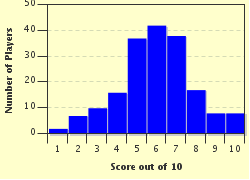Quiz Answer Key and Fun Facts
1. One of the most well known models of personality traits is called the "Big Five", which identifies five broad super-traits useful for understanding personality. Which of the Big Five personality factors is associated with curiosity, artistic interests, and liberal values?
2. An alternative model to the Big Five, proposed by Hans Eysenck, consists of only three major factors. Which of the following traits does not form part of Eysenck's model of personality?
3. Which of the following traits does NOT form part of the "dark triad" of antisocial traits?
4. Which of the Big Five personality factors has been most strongly linked with having any mental disorder?
5. Robert Cloninger developed the Temperament and Character model of personality as an alternative to the Big Five. Which trait in this model is linked with spiritual ideas such as experiencing a sense of oneness with the universe?
6. What trait concept was developed to help understand individual differences in hypnotic susceptibility?
7. Timothy Leary, the Harvard psychologist who later became notorious for his involvement in LSD research, was a pioneer in the development of what personality model?
8. Which trait has been proposed in recent years as a sixth factor of personality in addition to the more well-known Big Five?
9. Since the 1960s, claims have been made that psychedelic drugs have mind-expanding or mind-opening properties. In a widely publicised 2011 study, volunteers who had never taken psychedelics before were administered the drug psilocybin, the active ingredient in "magic mushrooms". A follow up performed 14 months later found that they had undergone a sustained increase in what major personality factor?
10. What personality trait is most strongly and consistently linked with academic and occupational performance?
Source: Author
agentofchaos
This quiz was reviewed by FunTrivia editor
CellarDoor before going online.
Any errors found in FunTrivia content are routinely corrected through our feedback system.

